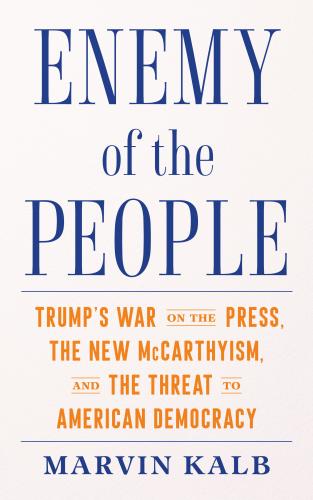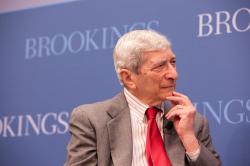Marvin Kalb is an award-winning journalist and the author of “Enemy of the People,” a forthcoming book on President Trump’s efforts to delegitimize the American press.
Shortly after assuming the awesome powers of the presidency, Donald J. Trump declared war on the American press. With a torrent of insulting tweets, he has accused reporters of being the “enemy of the American people,” using a phrase familiar to 20th century dictators but unprecedented in a democracy. Reporters are also, in his judgment, “very unpatriotic,” “disgusting and dishonest people,” who indulge in “fake news.” How many so indulge, you ask? Ninety-one percent, he responds. Only 9 percent can be trusted, and they all work for FOX News.
Trump’s goal, transparent as it is dangerous, is to demean, humiliate, and undermine the credibility of the mainstream press, one of the pillars of American democracy. To an alarming extent, he appears to have succeeded, especially among members of the Republican Party, which currently controls the levers of power in the U.S. government.
The impact could be catastrophic, producing a constitutional crisis more profound than the Watergate scandal.
For example, if the special counsel, Robert Mueller III, produces a formal charge of “obstruction of justice,” or, possibly, proof of “collusion,” “conspiracy,” or “cooperation” with the Russians during the 2016 presidential campaign; or if a newspaper points unmistakably to Trump being engaged in illegal money laundering; or if a judge concludes Trump has indeed violated the emoluments clause of the U.S. Constitution (unlikely though that may be), Trump has now positioned himself, with a wave of the hand, to dismiss any and all of this as nothing more than “fake news” disseminated by “failing” and “corrupt” news organizations—none of it, in any case, to be taken seriously, all of it, the work of the “Trump Derangement Syndrome.”
Because Trump has bewitched the Republican Party, magically converting it into his own plaything, there is a strong likelihood that a substantial majority of Republicans, in and out of Congress, will accept his argument, and do nothing, leaving Trump able to escape the consequences of his many failings, even though the evidence would likely point to his complicity and guilt. And, in this context, where then is the rule of law, the idea that no man stands above the law, another pillar of American democracy?
Of course, the Democrats would object powerfully, but, short of votes on Capitol Hill, they would be unable to launch impeachment hearings, or effect policy. The 91 percent of the media that Trump described as “fake news” would continue to produce superb reporting on one Trump malfeasance or another, but these reports would have little effect. Cable news commentators would, on FOX, rally to the president’s defense, while those on MSNBC would continue to eviscerate him, just as they have been doing since his inauguration. But, magically, Trump would likely bob and weave and somehow duck the noose of political punishment.
The press has always been central to the president’s strategy: he’s mesmerized by it but at the same time repelled by it.
Once upon a time, 30 or 40 years ago, CBS’s Walter Cronkite was able to close his evening newscast with the tag line “…And that’s the way it is,” and most of his viewers would believe him. He was “the most trusted man” in America. Today there is no Walter Cronkite. Over the years, for many reasons, the general public has begun to distrust much of what they see, hear, and read on the news. According to a recent Gallup poll, only 32 percent of Americans now have a “great or fair” amount of trust in the press. Twenty years ago, it was 55 percent. Seventy-three percent believe that, thanks to the wild world of social media, there is now more inaccurate information floating around than ever before. So, what can be trusted? Trump skillfully plays into this netherworld of bewilderment and confusion.
Though 85 percent of Americans still believe “freedom of the press is essential to American democracy,” significant percentages now also believe the government should have the right to crack down on the press in ways decidedly antithetical to the 1st Amendment. For example, 48 percent of Republicans agree with Trump that the press is, in fact, “the enemy of the American people,” according to a recent Ipsos poll. (Remarkably, 12 percent of Democrats and 23 percent of Independents also agree.) Forty-three percent of Republicans now think the president should have the power even to shut down news organizations that, in his judgment, have “engaged in bad behavior.” In Trumpese, that means covering him with a critical, skeptical eye, the proper role for a journalist.
The short-term consequences of Trump’s apparently successful management of the media are dangerous; the long-term consequences are simply frightening.
One example of the short-term danger: covering a Trump rally these days opens reporters, now more than ever, to jeers, middle finger insults, and threats of violence. Many have to be protected by their own ”security guards.” CNN’s Jim Acosta, who covers the White House, said he was “very worried” by the “hostility whipped up by Trump.” MSNBC’s Katy Tur told her viewers that she has been threatened with “rape”—and worse. A reader warned Times columnist Bret Stephens, “once we start shooting you fu—ers, you aren’t going to pop off like you do now.”
Long term: not just in the United States, but in many other countries, too, the Trump message of suspicion and hostility toward the press has spread—and with it, a global turning away from democracy and toward authoritarianism. Trump did not create this rightwing movement, but he is riding its crest; and because of the power of his office, he is driving it to new heights of acceptability.
Democrats may object to this behavior, but their minority status in Congress (and best hope in 2018 to capture only one chamber) limits their ability to respond effectively. Republicans, dependent on the voters who Trump has hypnotized with his anti-media rhetoric will not dare challenge the head of their party on this point, for fear of hurting their own political fortunes.
By his fiery anti-press rhetoric, President Trump has undermined American democracy, opening the door to a constitutional crisis.
The Brookings Institution is committed to quality, independence, and impact.
We are supported by a diverse array of funders. In line with our values and policies, each Brookings publication represents the sole views of its author(s).






Commentary
Trump is winning!
August 17, 2018